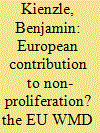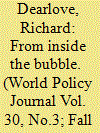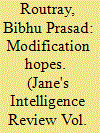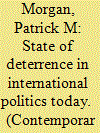|
|
|
Sort Order |
|
|
|
Items / Page
|
|
|
|
|
|
|
| Srl | Item |
| 1 |
ID:
123885


|
|
|
|
|
| Publication |
2013.
|
| Summary/Abstract |
In the aftermath of the ruptures caused by the Iraq crisis, European states agreed in December 2003 on both a European Security Strategy and an EU Strategy against the Proliferation of Weapons of Mass Destruction (WMD).
Ten years have passed since this attempt to kick-start common European policies on WMD proliferation. How well have EU policies performed in this area? Has a specifically European way of dealing with proliferation challenges emerged?
This article traces the development of EU policies on WMD proliferation since 2003 by examining, in particular, European reactions to the nuclear crisis in Iran, as well as European interactions with the international non-proliferation regime and the cooperation with partner countries. The article concludes that the EU has performed much better than might have been expected in an area that has traditionally been one of the fiercely guarded prerogatives of national security policies.
The EU's good performance is very much related to institutional flexibility, as exemplified by the EU/E3 approach to Iran, and to a high degree of political pragmatism. However, important shortcomings remain, most notably the lack of coordination between national and European non-proliferation efforts. In other words, the EU has not in the last 10 years turned into a fully fledged non-proliferation actor that can deliver tangible results in any area of proliferation concern.
|
|
|
|
|
|
|
|
|
|
|
|
|
|
|
|
| 2 |
ID:
125947


|
|
|
|
|
| Publication |
2013.
|
| Summary/Abstract |
CAMBRIDGE, England-For 38 years, I worked in a world governed by rules of secrecy. Knowledge was compartmented and needing to know something was the principle that governed one's right to know it. Did that system serve a useful purpose? Unequivocally it did. It was there to protect, in perpetuity if necessary, the identity of the sources, human and technical, that provided the intelligence that contributed to the creation of effective defense, foreign, and national security policies. Did that useful purpose in turn serve the public interest and the interests of individual citizens? It would be difficult to argue that it did not, particularly when the overarching threat that those policies were designed to counter was for the majority of my intelligence career thermonuclear obliteration. Why today are we apparently so uncertain about a government's need for secrecy? Why are those who set out to challenge that secrecy portrayed by some as heroes? Whistleblower or traitor, opinion is divided.
|
|
|
|
|
|
|
|
|
|
|
|
|
|
|
|
| 3 |
ID:
131890


|
|
|
| 4 |
ID:
112451


|
|
|
|
|
| Publication |
2012.
|
| Summary/Abstract |
In comparison with the Cold War era, deterrence in international politics has changed significantly, even though many of the basic components of that deterrence still exist and continue to have an impact. Deterrence is now less salient in national security policies and international security management, more recessed, particularly nuclear deterrence. This is primarily due to the huge changes in international politics ushered in by the end of the Cold War, particularly in great-power political relationships, and which are continuing to unfold. Important developments are underway with respect to nuclear deterrence, extended deterrence, collective actor deterrence, and other aspects of international system security. While many old topics pertaining to deterrence continue to be studied and generate continuing controversies, often along the same lines as in the past, some important investigations and theoretical analyses have also emerged on pivotal deterrence, the deterrence of cyberattacks, terrorism, and international crime. What is needed most is analysis on how to develop and apply deterrence strategy and practice in new ways as a central contribution to global and regional system security maintenance and management, a function deterrence performed during the Cold War but in ways now largely out of date. Also needed is careful attention to the possibility of the return of more traditional international politics, particularly if this were to occur in relations among the major states, and careful consideration of how best to use deterrence to hedge against such a development.
|
|
|
|
|
|
|
|
|
|
|
|
|
|
|
|
|
|
|
|
|